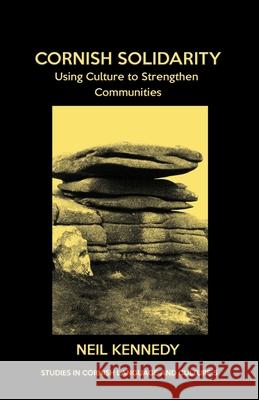Cornish Solidarity: Using Culture to Strengthen Communities » książka
Cornish Solidarity: Using Culture to Strengthen Communities
ISBN-13: 9781782011965 / Angielski / Miękka / 2016 / 224 str.
Can local cultures be used to strengthen community bonds, boost morale, and equip and motivate people socially and economically? This book reviews how Cornish cultures are marketed, portrayed, and imagined against the background of a tourism-led "Lifestyle Cornwall," migration, deindustrialization, and deprivation. It links culture's primary emotional and social uses with well-being, and considers intervention in practice and policy to tackle disadvantage and to build cohesive communities that can adapt to change. Cultural, social, symbolic, and human capital are related to local knowledge, to community narratives, to belonging, and to emotional prosperity. Demographic and economic transformations threaten the very survival of a Cornish tradition, but this discussion affirms an outward- and forward-looking vision that allows for Cornishness to evolve, to grow stronger, and to be passed on to new residents and future generations. It is meant to inform and provoke consideration by cultural practi-tioners, community activists, and policy-makers on how to maintain Cornishness in ways that favour the well-being of "One and All." In particular, it addresses those who are aligned with a broad Cornish Movement of socially engaged, cultural, economic, environmental, and political action, and identifies them as having the potential to bring about change. Cornish-ness is discussed with reference to a distinct post-industrial inheritance, to the Cornish Language, and to Celtic Revivalism, and related to a common habitus that distinguishes it. Neil Kennedy is a Cornish speaker, university ESOL teacher, and former cultural studies lecturer, originally from Mid-Cornwall, who has been involved in the Cornish Movement since the 1980s.
Can local cultures be used to strengthen community bonds, boost morale, and equip and motivate people socially and economically? This book reviews how Cornish cultures are marketed, portrayed, and imagined against the background of a tourism-led “Lifestyle Cornwall”, migration, deindustrialization, and deprivation. It links culture’s primary emotional and social uses with well-being, and considers intervention in practice and policy to tackle disadvantage and to build cohesive communities that can adapt to change. Cultural, social, symbolic, and human capital are related to local knowledge, to community narratives, to belonging, and to emotional prosperity. Demographic and economic transformations threaten the very survival of a Cornish tradition, but this discussion affirms an outward- and forward-looking vision that allows for Cornishness to evolve, to grow stronger, and to be passed on to new residents and future generations. It is meant to inform and provoke consideration by cultural practitioners, community activists, and policy-makers on how to maintain Cornishness in ways that favour the well-being of “One and All”. In particular, it addresses those who are aligned with a broad Cornish Movement of socially engaged, cultural, economic, environmental, and political action, and identifies them as having the potential to bring about change. Cornishness is discussed with reference to a distinct post-industrial inheritance, to the Cornish Language, and to Celtic Revivalism, and related to a common habitus that distinguishes it. Neil Kennedy is a Cornish speaker, university ESOL teacher, and former cultural studies lecturer, originally from Mid-Cornwall, who has been involved in the Cornish Movement since the 1980s.











